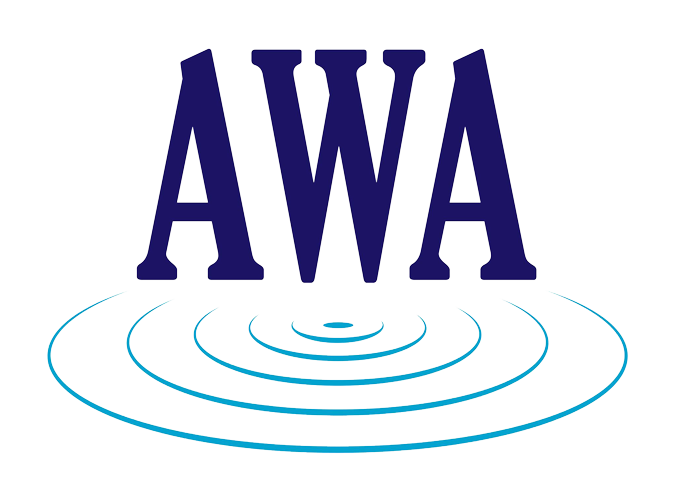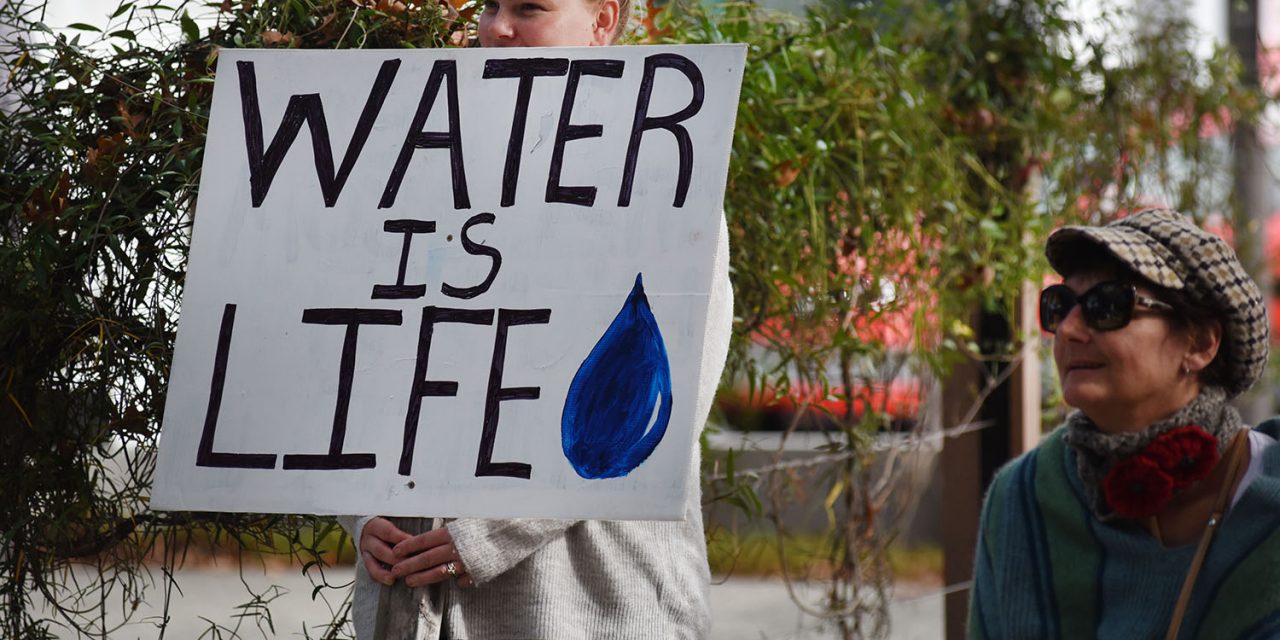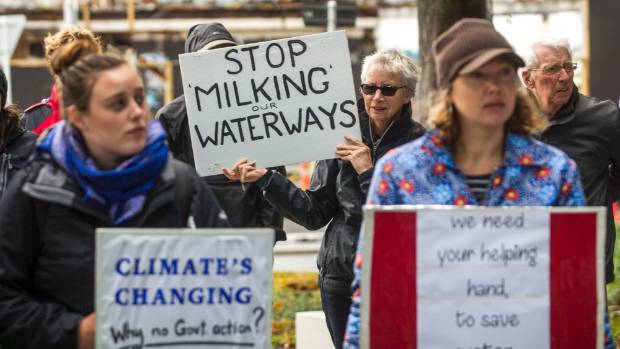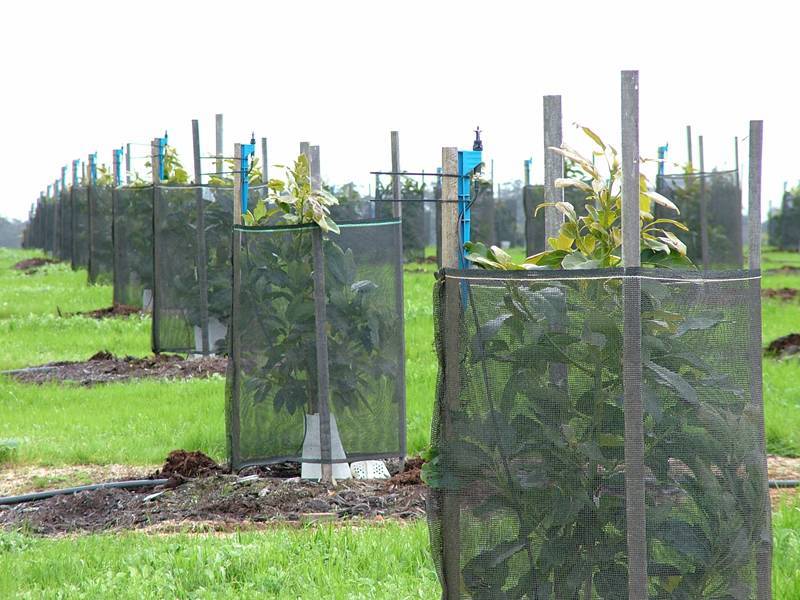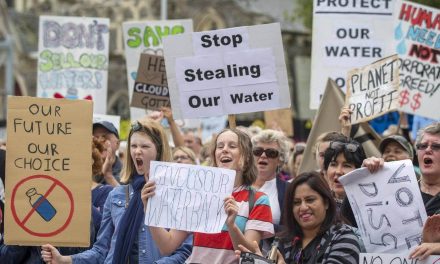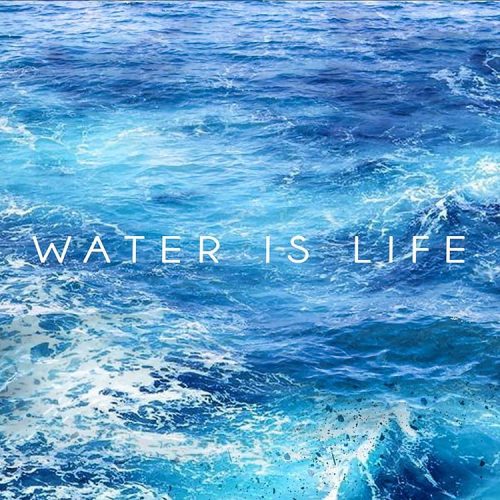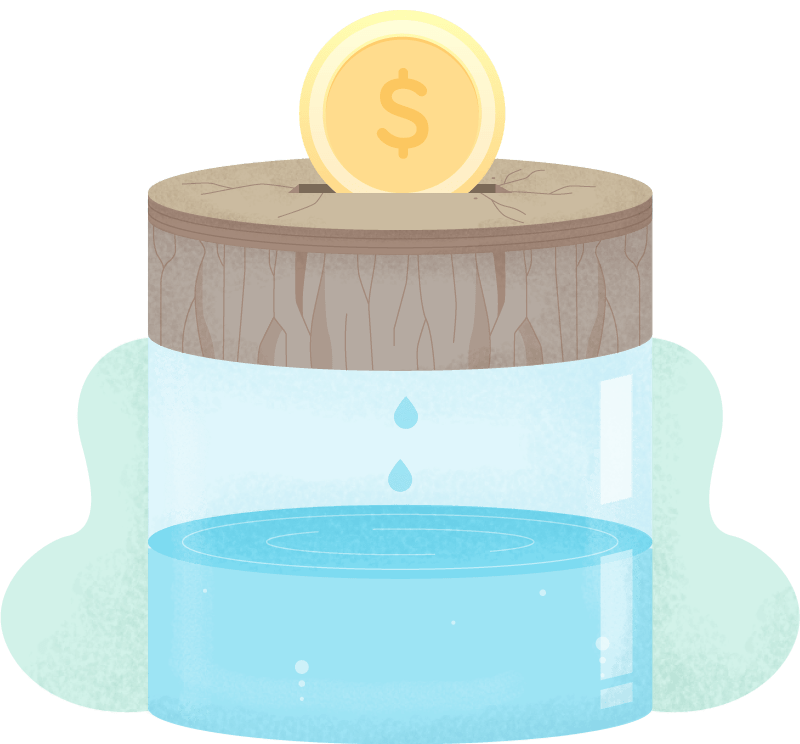This article was first published in Organic NZ, Nov/Dec 2018 www.organicnz.org.nz
The catch-cry ‘water is life!’ is fast going mainstream, thanks to proliferating direct civic action and media attention in response to Aotearoa’s escalating freshwater state of emergency. This was spurred on by National’s gutting of the Resource Management Act and the Local Government Act under its neo-liberalist ‘endless-economic-growth-on-a finite-planet’ agenda, despite international alarm bells about water crises and their impacts.1See for example the World Economic Forum’s 2018 Global Risks Report available at www3.weforum.org/docs/WEF_GRR18_Report.pdf.
The consequences have been disastrous, with water over-allocation to the dairying, bottling and other industrial sectors. Coupled with harmful contamination of remaining water supplies, it’s a health catastrophe-in-waiting that will make the Hawke’s Bay campylobacter outbreak look like a walk in the park.2See ‘Gastro outbreaks may have gone undetected – researchers’ (Radio NZ, 5 June 2018) at bit.ly/2pAhW7u and the Government Inquiry into Havelock North Drinking Water: www.dia.govt.nz/Government-Inquiry-into-Havelock-North-Drinking-Water
Externalising costs of pollution and waste
New Zealand’s crisis is underpinned by countless paradoxes which must be resolved. Take business and industry (including food production). We’re told it’s the engine room that keeps our economy ticking over for society’s benefit, yet it externalises pollution and wasteful water use. This reflects a United Nations study revealing that, when fully audited on environmental and social impacts, companies are actually running at a loss.3Ref for example this report ‘Natural Capital at Risk’, produced for The Economics of Ecosystems and Biodiversity (TEEB) program, sponsored by United Nations Environmental Program: bit.ly/2fwVLMc It’s profit subsidisation and ‘social’ welfare mostly for the industry sector, meaning that the whole ‘free market’ economy is a sham – unless freedom means businesses are at liberty to flourish while nature and ordinary folk are oppressed.
This is symptomatic of a deeper capitalistic pathology of commodifying and financialising the necessities for dignified human existence, rooted in an ominous loss of respect for nature: nothing is sacred in the pursuit of private profit making – not land, water or air.
Rights of nature the Aotearoan way
The remedy? A radical socio-economic overhaul to a system more democratic, one that puts the environment first. Kate Raworth’s ‘doughnut economics’ model is one we can draw from: see www.kateraworth.com/doughnut. And not just any ‘tyranny of the majority’ type democracy, but a unique Aotearoan brand moderated by tangata whenua rights as guaranteed by Te Tiriti o Waitangi, including kaitiakitanga rights to and obligations over water. (The closest, but still-not-equivalent, Pākehā concept to kaitiakitanga being ‘guardianship’ or ‘stewardship’ – for example in regards to lands and habitats currently administered by the Department of Conservation.)
These rights are also recognised by the Waitangi Tribunal,4For example see information on the Tribunal’s ‘National Fresh Water and Geothermal Resources Inquiry’ or search for the several river claims on the Tribunal website at www.waitangitribunal.govt.nz. in the United Nations Declaration on the Rights of Indigenous Peoples, and in innovations pioneered right here in New Zealand (such as the legal personhood protections granted to the Whanganui River in 2017).5bit.ly/2O3rPcC When the rights of one are protected, all benefit. Therefore, it’s in everyone’s interests to actively protect indigenous rights.
Simultaneously, constitutional transformation needs to be high on our Government’s agenda. Citizens should demand entrenchment of protections for our natural environment (as necessary for all life) and human rights as superior to corporate (i.e. legal personhood) privileges.6For more information, see the United Nations Department of Economic and Social Affairs’ ‘International Decade for Action Water for Life 2005–2015’ web portal at www.un.org/waterforlifedecade/human_right_to_water.shtml. Such constitutional protections, when made easier to access and understand, will mean people can effectively defend them when they come under attack.
Positive directions
To its credit, the Ministry for the Environment is taking action in response to what it sees as ‘considerable and practical difficulties in defining water resource use limits and subsequently calculating over-allocation.’7‘Definition and calculation of freshwater quantity over-allocation’ (Ministry for the Environment, March 2018): bit.ly/2zTdgj9 The long-overdue water assessment and monitoring improvement should see positive flow-on effects for the scientific basis for water allocation decision-making. The current Government has also taken flak for its bold (but correct) move to dampen down large-scale irrigation projects,8‘Irrigation projects on hold as Government rethinks priorities’ (Stuff, 2 September 2018): bit.ly/2yerxVK and is leading its Three Waters Review.9See ‘Three Waters Review’ (20 August 2018) at www.scoop.co.nz/stories/PO1808/S00274/three-waters-review.htm; and www.dia.govt.nz/Three-waters-review. In addition, the Green Party recently won agreement to consider a ‘water test’ as part of the Government’s review of the Overseas Investment Act which would ‘stop people buying land for water bottling.’10Ref ‘Greens push for ‘water test’ on foreign land sales in bid to stop bottling plants’ (Stuff, 18 August 2018) at bit.ly/2zSb3Ve
A call to action!
Citizens are urged to participate in these and other initiatives, while being vigilant for ‘false solutions’ (such as ‘patching’ reticulated water supplies with chlorine, when what’s needed is to replace aging infrastructure; or proposals which are a Trojan horse for destructive privatisation).
Climate crisis calls on us to create resilience. New Zealand now has a wealth of hindsight, plus a Government with a strong Green heart. Tell your elected officials what you want, and not just at the voting booths. When they act in keeping with life-nurturing values, cheer them on; and when they don’t, hold them accountable. Together, we can protect our water sovereignty, and restore and responsibly manage our precious water resources.
Sources:
- See for example the World Economic Forum’s 2018 Global Risks Report available at www3.weforum.org/docs/WEF_GRR18_Report.pdf.
- See ‘Gastro outbreaks may have gone undetected – researchers’ (Radio NZ, 5 June 2018) at bit.ly/2pAhW7u and the Government Inquiry into Havelock North Drinking Water: www.dia.govt.nz/Government-Inquiry-into-Havelock-North-Drinking-Water
- Ref for example this report ‘Natural Capital at Risk’, produced for The Economics of Ecosystems and Biodiversity (TEEB) program, sponsored by United Nations Environmental Program: bit.ly/2fwVLMc
- For example see information on the Tribunal’s ‘National Fresh Water and Geothermal Resources Inquiry’ or search for the several river claims on the Tribunal website at www.waitangitribunal.govt.nz.
- bit.ly/2O3rPcC
- For more information, see the United Nations Department of Economic and Social Affairs’ ‘International Decade for Action Water for Life 2005–2015’ web portal at www.un.org/waterforlifedecade/human_right_to_water.shtml.
- ‘Definition and calculation of freshwater quantity over-allocation’ (Ministry for the Environment, March 2018): bit.ly/2zTdgj9
- ‘Irrigation projects on hold as Government rethinks priorities’ (Stuff, 2 September 2018): bit.ly/2yerxVK
- See ‘Three Waters Review’ (20 August 2018) at www.scoop.co.nz/stories/PO1808/S00274/three-waters-review.htm; and www.dia.govt.nz/Three-waters-review.
- Ref ‘Greens push for ‘water test’ on foreign land sales in bid to stop bottling plants’ (Stuff, 18 August 2018) at bit.ly/2zSb3Ve
